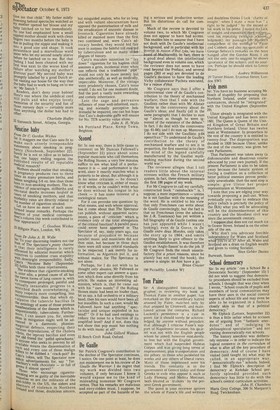Stoned
Sir: In one way, there is little cause to comment on Mr Duncan Fallowell's (September 22) piece about some popular musicians who call themselves the Rolling Stones; a very few minutes suffice to see what kind of a performance it is — and performance is the word, since it exactly matches what it purports to be about. But although it is in no sense criticism — he doesn't know what criticism is, either of music or of words, or he couldn't write what he does without his tongue in his cheek — it has some interest of a sociological nature.
For it can provoke one question: by what means, and with whose approval, has it come about that The Spectator can publish, without apparent satiric intent, a piece of ' criticism ' which is evidence only of the total abnegation of the critical function? A parallel piece could never have appeared in The Spectator of, say, sixty years ago, not because of prejudice or because parallel music and musicians did not then exist, but because in those day's there were still some critical standards to be respected. I ask merely for information, as Algernon put it, and without malice, for The Spectator is not alone.
Perhaps, for I do not wish to be thought only abusive, Mr Fallowell or some other expert can answer a question which does arise directly from his article. He makes an interesting admission, which is, that he came out with his "ears numb:" if the Rolling Stones music had been no louder than, let us say, a full orchestra or a military band, then his ears would have been all but inaudible. In such a case, would Mr Fallowell have had anything "spectacular and unique exploded in his head?" Or if he had used earplugs to reduce the noise to a fraction of its amplified level? And if not, does this not show that pop music has nothing to do with music at all?
John Gillard Watson 32 Beech Croft Road, Oxford.


































 Previous page
Previous page